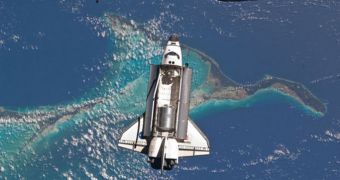Officials at the American space agency announced yesterday, July 11, that they decided to extend space shuttle Atlantis' final mission to the International Space Station (ISS) by an additional day. The decision was taken after carefully weighing all the pros and cons.
Initially, the flight – which is also the last of the Space Shuttle Program (SSP) – was supposed to last for 12 days, including the time the orbiter spent catching up with the ISS after launch, and flying away from the space lab after undocking.
The new measure implies that the spacecraft will not land at the Kennedy Space Center (KSC) on Wednesday, July 20, but rather on Thursday. All other details of the landing remain unchanged.
According to mission controllers, the STS-135 flight was extended primarily to allow astronauts more time to unload the 9,500 pounds (4,318 kilograms) of cargo their shuttle carried to the ISS. The extra time will also be used for rest, to minimize the risk of errors on their way back.
During this mission, the Multi-Purpose Logistics Module (MPLM) Rafaello carried all the spare parts, experiments, food, water and fuel to allow for continued ISS operations through at least 2012. A joint crew of 10 astronauts are working on unloading the payload module.
Atlantis' power systems can handle an extra day of strain, NASA officials also added. In other words, the shuttle has enough reserves to last it for the extra 24 hours, and the two days it will then spend in space getting into position for atmospheric reentry.
“There's a lot of good work that we can help the space station program with – if we had more time to give them, we probably would do that as well,” said yesterday in a news briefing LeRoy Cain, who is the leader of the Atlantis mission management team at NASA.
In related news, engineers at Mission Control have cleared Atlantis of all concerns related to its heat shields. There is no need for the STS-135 crew to perform a focused inspection of any areas. These preliminary results are based on data collected from three sources.
The first dataset was collected by video cameras that monitored the shuttle during ascent. The second one was put together by the heat shield inspection the crew conducted during the orbiter's first day in space, while the third was collected by members of the Expedition 28 crew.
At this point, Atlantis is scheduled to land at 5:56 am EDT (0956 GMT) on Thursday, July 21, Space reports.

 14 DAY TRIAL //
14 DAY TRIAL //